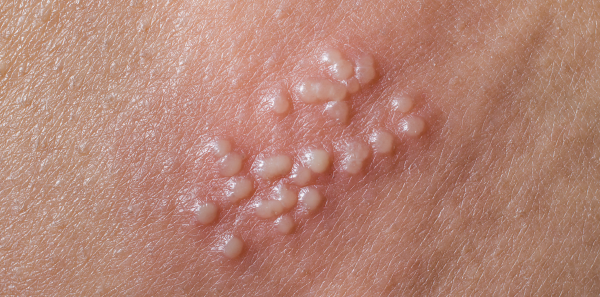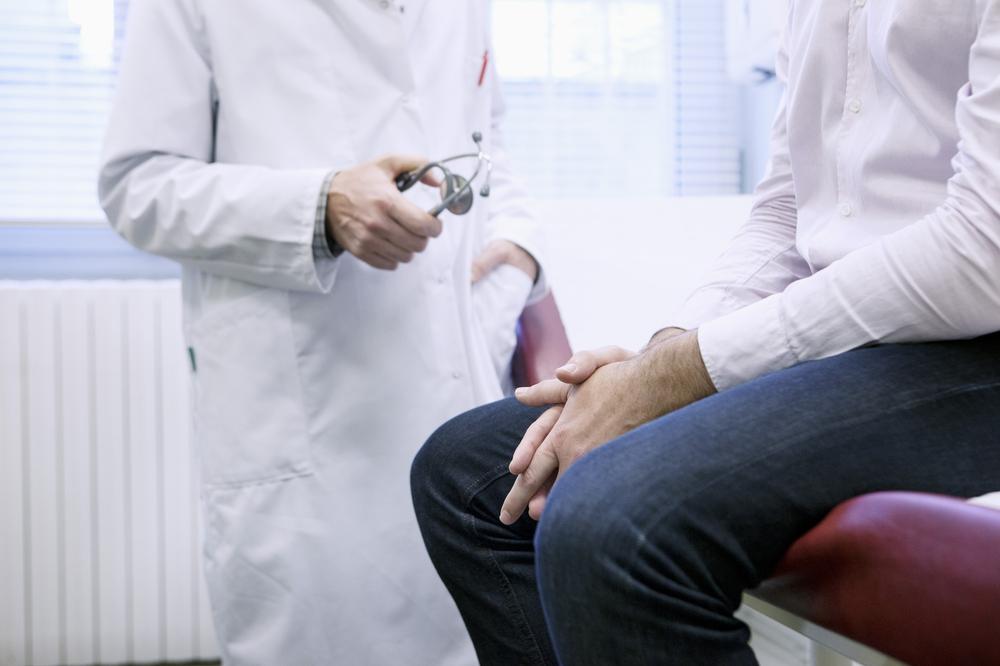Genital herpes is a sexually transmitted infection (STI) characterized by the appearance of small painful vesicles on the sexual organs. These vesicles are transparent and filled with liquid. Symptoms manifest by flare-ups. The vesicles are visible for five to ten days, then disappear often for several months before reappearing. Genital herpes is a chronic infection; it is impossible to get rid of the virus. On the other hand, treatments succeed in relieving symptoms and reducing the frequency of relapses.
Note: Genital herpes is a particular class of herpes caused by a herpes simplex virus (HSV). Herpes simplex viruses are a large family of viruses that can cause infections in various parts of the body: the genitals (genital herpes), in the mouth or on the lips (labial herpes or wild-fire), on the skin (Varicella), nerves (shingles), eyes (ocular herpes), etc. Most commonly, herpes simplex virus type 2 (HSV-2) is responsible for genital herpes, whereas herpes labialis is most commonly caused by HSV-1.
Transmission Mode
Genital herpes has features that cause unpredictable transmission. We think that:
- 20% of people infected have no symptoms and are unaware that they are carriers of the virus and therefore are unpredictable contagious
- 60% of people infected have symptoms, but do not know that they suffer from genital herpes. Either their symptoms are minor or they confused with those of another problem (e.g, for women, vaginitis or irritation)
- Only 20% of people infected have symptoms and know that they are suffering from genital herpes.
It is, therefore, essential to consult a doctor as soon as possible if you think you have genital herpes, even if the symptoms are minor; see the Symptoms section below.

Genital Herpes: More Follow
Most commonly, genital herpes transmitted at the time of unprotected vaginal or anal intercourse with a person infected with the herpes virus. The latter enters the body by microscopic lesions present on the skin or by in the mucous membranes; the highest risk of transmission is at the onset of a herpes outbreak when the vesicles are present, because the fluid they contain, contains viruses. The lesions remain contagious as long as they have not completely dried out. The virus can spread easily during sexual intercourse, even if there is no penetration.
However, in the majority of cases, the genital herpes virus transmitted when the infected person does not show any apparent symptoms. Silent reactivation can occur anywhere between the waist and upper thighs, so it does not only touch the genitals. It is the main cause of new infections; sexual intercourse between the mouth and sex can cause transmission of the herpes labialis virus to the genital organs. The reverse is also possible, but less frequent.
Genital herpes is not contracted by indirect contagion, coming into contact with objects used by an infected person (such as the seat of a toilet and bath towels) because the virus dies rapidly once out of the body. One can not catch this virus by contact with the water of the bath and the pool. It is however recommended not to share your razor with an infected person.

Stages of the disease
- The first push: The symptoms appear two to six days after the contagion. Generally, the first thrust causes more intense symptoms than the following. In addition to the vesicles, fever, headache, and fatigue may be present. Herpetic lesions may last longer, up to three weeks. In more than 20% of cases, the first outbreak is asymptomatic and therefore goes unnoticed.
- The period of dormancy: Once the symptoms have disappeared, the virus rises along the nerves at the base of the vertebral column. It is then housed in a ganglion, where it remains inactive until reactivated, such as at the time of a weakening of the immune system.
- Recurrences with symptoms: The majority of infected persons have at least one recurrence during the first year after the first outbreak. According to some sources, lesions recur on average 4 or 5 times during this first year. Thereafter, the frequency of recurrences varies greatly: some individuals will have only 2 crises during their lifetime, while others will have several crises per year. However, as the years go by, recurrences are less frequent and their severity diminishes.
- Silent reactivations: In this case, the virus is reactivated but it does not cause visible symptoms while being very contagious. Silent reactivations are more frequent in women with genital HSV-2 infection than in HSV-1 (55% versus 29%). There may be a similar difference in men.

Possible consequences and complications
In healthy individuals, genital herpes usually does not have serious physical consequences. However, when the immune system weakened (by another disease, for example), the symptoms will be more severe and last longer. Even if the physical lesions are not dangerous, the psychological stress caused by genital herpes, difficult to live. Affected people, embarrassed about talking about their illness, and afraid to pass it on to their partner. This infection has profound consequences on the intimate and sexual life, which can lead to depression. In rare cases, the virus can cause meningitis or encephalitis (inflammation of the brain). The infection of the eye (ocular herpes) can cause corneal lesions and even blindness.
Note: People infected with the herpes simplex virus are at greater risk of contracting the human immunodeficiency virus (HIV) if exposed to it during sexual intercourse.

Symptoms of genital herpes
The first outbreak of herpes is sometimes preceded or accompanied by a headache, fever, fatigue, muscle pain, loss of appetite, and swollen glands in the groin. A recurrence of genital herpes lasts on average five to ten days and can sometimes last up to two or three weeks. Here are the main symptoms:
- Warning signs such as sensitivity, tingling, or itching in the genital area may indicate the onset of a seizure. Fever and headaches can also manifest. All of these symptoms called “prodrome”. In general, this one manifests itself one or two days before the appearance of the vesicles.
- Small transparent vesicles most often grouped together forming a “bouquet” then appear in the genital area. When they break, they form small ulcers to live, then crusts. These lesions take a few days to heal and leave no scars.
- In women, vesicles can form at the entrance of the vagina, on the vulva, on the buttocks, on the anus, and on the neck of the uterus.
- In men, they can appear on the penis, scrotum, buttocks, anus, and thighs, and in the urethra
- Urination gets painful when the urine comes into contact with the wounds.

Prevention of genital herpes
Once infected with the genital herpes virus, it is carried in the body for the rest of the patient’s life, and s/he gets exposed to multiple recurrences. By taking care not to contract genital herpes, we protect ourselves against the consequences of the infection and we also protect our sexual partners.
Basic measures to prevent the transmission of genital herpes
- Do not have genital, anal, or oral sex with a person who has lesions as long as the lesions not completely healed.
- Always use a condom if one of the two partners is carrying the genital herpes virus. Indeed, a carrier is always capable of transmitting the virus, even if it is asymptomatic (i.e., if s/he does not show symptoms).
- The condom does not completely protect against the transmission of the virus, as it does not always cover infected areas. To provide better protection, a female condom used to cover the vulva.
- The dental dam can serve as protection during oral sex.
- Avoid triggering factors. Careful observation of what happens before a flare-up can help determine the circumstances that contribute to recurrence (stress, medication, etc.). These triggering factors can then be avoided or minimized as far as possible.
- Strengthen your immune system. The control of recurrences of a herpes virus infection relies heavily on vigorous immunity. A healthy diet (see the Nutrition file), adequate sleep, and physical activity are some of the factors contributing to good immunity.

Can genital herpes be detected?
In clinics, genital herpes is not screened for other sexually transmitted infections (STIs), such as syphilis, viral hepatitis, and HIV. However, in certain special cases, a doctor prescribes a blood test. This test detects the presence of antibodies against the herpes virus in the blood (HSV type 1 or 2, or both at the same time). If the result, negative, it makes it possible to establish with certainty that a person not infected.
However, if the result positive, the doctor does not assert that the person really infected because this test often produces false-positive results. In the case of a positive result, the doctor can also rely on the symptoms of the patient, but if he has none or never has the uncertainty increases. The test can be useful to help with the diagnosis of herpes, for people who have had repeated genital lesions (if they are not apparent at the time of the doctor’s visit). Exceptionally, it is used in other cases. If you wish, discuss with your doctor the suitability of this test. Note that you should normally wait 12 weeks after the onset of symptoms before taking blood.


